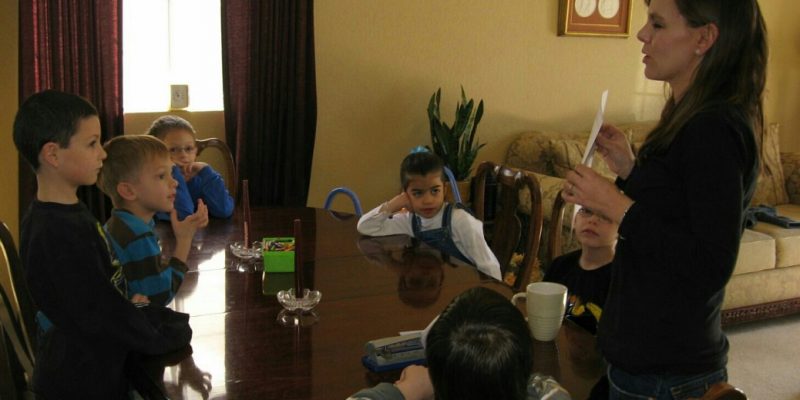When I started having children I was going to do everything right as a mom and my children were all going to grow up and live committed Christian lives. That was the plan at least. So many things didn’t turn out the way I planned, but the Lord has used some of those difficult things in my life.
My oldest son Jonathan was an intelligent and determined kid from the time he was quite young. He was an early talker and once he started, he never stopped. He’s almost 21 now and we’re still listening. He always loved to sing the Psalms and hymns. Before he was three he could sing through all verses of his favorite hymn, Come Thou Fount of Every Blessing. On Sunday evenings when our church would take hymn requests, his hand was the first up. He had many favorites, oftentimes it was whatever hymn we’d been working on in family worship.
As a little kid he loved playing pretend church. He received a children’s microphone and mic stand for his fourth birthday. He would set it up in front of the fireplace and say, “We’re doing church now.” He’d get frustrated with his little brothers when they wouldn’t sit still while he led music and preached a mini sermon. It wasn’t just the playing though; he liked to talk about the Lord and things from Scripture and discuss what he was learning from the children’s catechism.
At four-and-a-half years old he came to me and said, “Mommy, if Jesus paid for all my sins, why did he only die on the cross once?” I tried explaining but he looked at me puzzled and said, “Can you call Pastor now and get the right answer?” He wasn’t satisfied with Pastor’s answer either, declaring it was “too much.” When an OPC Pastor friend was visiting, he gave Jonathan an answer that made sense to him and that he finally understood. These were the sorts of things he was thinking about and trying to understand at an early age.
I was encouraged from the time he was young that he was thinking through things of the Christian faith. During family worship he was excited to learn, loved to ask and answer questions and prayed fervently. He was determined to memorize the Children’s Catechism and had all 145 answers memorized by the time he was six-and-a-half. We sometimes even wondered if he would be a pastor one day. As he got older he became increasingly passionate about the Christian faith. He was unashamed and would talk to anyone who would listen. By middle school he was learning more about apologetics and reading various Christian books. We continued to have these amazing conversations with him about the faith. We were convinced he had truly trusted in Christ.
Then everything changed.
I really can’t tell you exactly when, but sometime in high school he began questioning things. Our family had entered into a difficult season. I became very sick and was in and out of the hospital, and I knew he feared losing me. It changed our lives in many ways. He observed me in excruciating pain and physical misery. We also suffered several losses close together. My children have been to more funerals than some adults. He witnessed the difficult and untimely deaths of several people close to us, both family and friends, including the suicide of a family member. We became well acquainted with the horrors of cancer and other life threatening ailments. He saw the suffering of many and he himself was suffering, as he had begun to struggle with depression and anxiety. And then he revealed something I’d began to suspect. One day he said something to me I’ll never forget. “I can’t believe in a God who allows those who love Him to suffer so much.”
I was crushed. What had I done wrong? Did he not see me trusting Christ in the midst of suffering? Had he not been listening when I shared of my comfort in Christ through this difficult season? What could I do to get him to understand? It’s been a few years since that day, when my mother’s heart broke. The Lord has used this in my life in so many ways and I’ve learned many things.
- The importance of grace in our parenting
Around the time I first found out he was questioning things, I knew it wouldn’t be long, a few short years, before he’d be 18 and possibly out of our home. I asked myself a question: “What is the most important thing I want my children to understand before they leave home?” The gospel was that thing, but how was I going to do that? I’d already been preaching the gospel to him since he was a baby.
It was around that same time that I had a conversation with someone I’d attended church with as a teenager. We had reconnected after many years. I learned he had left the church and so I asked him “why?” He answered, “I was never good enough for my parents. How was I ever going to be good enough for God?”
His answer shocked me because the church he and I attended was excellent about preaching the gospel of justification by faith alone. It made no sense to me how he obviously didn’t understand the gospel at all. I did a lot of research and spoke with several people about it and became convinced that we as parents can help or hurt our children’s understanding of the gospel by our parenting. So often, we are focused more on obedience itself than the “why” of obedience. We excel at preaching the law in our home, but the gospel is often an afterthought. This can be damaging to our children.
I learned from and was encouraged by the stories I’d heard through the years from both Rod and Ted Rosenbladt (father and son). They both have very specific stories of how they understood the gospel and God’s unconditional love for them because of the grace their earthly fathers displayed. Legalism isn’t the answer. All law and no gospel isn’t the answer. Getting your children to obey perfectly apart from the gospel is not the answer.
I’ve noticed whenever I talk about grace-centered parenting, some people get nervous or uncomfortable because of assumptions that are sometimes made about what it looks like. We had Dr. Scott Keith on the Theology Gals podcast to talk about his book Being Dad: Father as a Picture of God’s Grace. He said something that I believe to be extremely important in this discussion: “Permissiveness is not the opposite of grace.” Parenting in a way that demonstrates the gospel in our home is not some “hyper-grace” or antinomian parenting model. It’s not permissive parenting. While we’ve attempted to demonstrate grace in our home while preaching the gospel to our children, there are still rules and punishment for indiscretions. But there are also opportunities for demonstrating grace. Dr. Keith’s book tells many of those stories, a couple of which he shared on our podcast. Dr. Keith in his tribute to Dr. Rod Rosenbladt on Being Dad says:
“Though I have always wanted compliant children, I am proud to say that I think I have throttled that sinful desire enough to have raised gracious and kind children instead who know that they are forgiven on account of Christ.”
- Trusting in the Lord for my children’s salvation
I didn’t realize it immediately when my son confessed his unbelief, but sometime later it hit me: I was trusting in myself for my children’s salvation and not in the Lord. Ithought I was trusting in the Lord for their salvation, but I really wasn’t. I believed the lie that if I just did everything right, took them to church, taught them the Bible, prayed with them, protected them from the world and so on, that of course they’d trust in Christ and walk with the Lord and never live in rebellion.
I’m not saying that we shouldn’t do the things I mentioned, we absolutely should train them in the Lord, but we must not forget that salvation is of Him. We must trust in Him for our children’s salvation. When the Lord convicted me of this and through repentance, prayer, and His work in me, I began to trust Him and something amazing happened: the Lord gave me great peace. God’s power is far greater than we often realize and there’s great peace and joy in trusting in His work in our children’s lives, and trusting in our Lord’s goodness and sovereignty.
I know that by even writing this and revealing I have a son who doesn’t walk with the Lord that some people may be asking, “I wonder what they did wrong that their son rebelled?” I probably would have thought the same thing once upon a time. And it’s not because I have a son who rebelled that my views have changed. I was wrong to believe that my children’s salvation was a result of the things I did.
Someone asked a question in a large Reformed Facebook group about whether it’s the parents’ fault if a child rebels. Had you asked me 20 years ago, I would have answered the same way most of the other parents of young children did, “Of course.” There was a clear difference between the way young parents commented on that post than parents with older children did. While yes, the Lord can and will use our obedience in training our children in “the way they should go,” those things do not promise they will never rebel. Even if we have a child in rebellion now, it doesn’t mean the Lord isn’t working in their lives to bring them to salvation. I’m grateful we taught our son Scripture, that he memorized the catechism, and understands the gospel. I pray the Lord uses these and will bring him to saving faith in Christ. I find comfort in the sovereignty, wisdom and love of God.
- The idol of obedient children
Our homeschool mom’s group did a study together and we talked about idols women can have: a good marriage, a clean house, and obedient children. Some women objected to the idea that good things could become idols, but they absolutely can. Michael Horton says:
“We picture idolatry as the worship of something evil. However, most of our idols are good servants, that we have made lords.”
The Heidelberg Catechism on idolatry:
Q. What is idolatry?
A. Idolatry is having or inventing something in which one trusts in place of or alongside of the only true God, who has revealed himself in the Word.
Obedient children was one of my idols. And I was trusting in myself over God to work in my children’s lives to bring them to salvation. I was often more concerned with what other people observed than I was with my children’s hearts. I even gave myself credit and was proud of myself when my children did seek the Lord and live in obedience. When our children do come to saving faith, it is because of the work the Lord has done in their lives. It is He who makes one alive when they were previously dead in their trespasses and sins. Ephesians 2:5
- He’s still my son
One day an old friend of mine asked me in a general way, “How’s Jonathan doing?” I explained that he was doing well, had a good job, a new apartment, was hoping to marry his girlfriend one day. In response she said, “Oh, I thought he didn’t believe in Christ and wasn’t going to church anymore.”
I understand she may have been referring to how he was doing spiritually, but I sensed it was more than that and it brings up something which concerns me. There’s anattitude from some parents when their children rebel, something I’m not sure I can describe well, it’s like they’re being given the message that they just aren’t good enough. The thing is, none of us are good enough, that’s why we need Christ. I think if we give our children this message, we’re neglecting to really give them the message of the gospel.
My son is still friends with several people he grew up with from our homeschool co-op and many of them have left the church. This response from their parents is something that these other kids sense. Jonathan has told me on several occasions that some of these friends will speak poorly of Christians, I think in part because of this attitude, and because of the legalism they grew up in. Jonathan tells me about these conversations he has with his friends who have also left the church. I was a bit surprised when he explained that he tells them, “Not all Christians are like that. My parents aren’t like that.” I think many of them view the heart and theme of Christianity as a list of rules rather than the gospel.
The same things that were important to teach and demonstrate to my son in his teenage years, continue to be important now. Being good enough is not the right response to our non Christian children, the gospel is. Unfortunately in some of our circles, I see lots of law and little gospel. This creates the hopelessness the friend I grew up with felt when he told me, “I could never be good enough for my parents. How will I ever be good enough for God?”
Why would we show less love in our interactions with our own child than we do to our non-Christian neighbor? Of course our relationship with our non-Christian child will have some differences from our relationship with our Christian child. I am grateful however to have a good and close relationship with my son still. I think that, because we’ve maintained that close relationship, he has felt free to continue to ask us questions about Scripture and the Christian faith. I have failed at times though, in my responses to Jonathan, and become defensive when it feels like an attack on my faith. I’m still learning.
The Lord will use this for my good and His glory
I don’t know what the Lord’s plans are for my son, but I can tell you the Lord has already used this experience in my life. I have told those close to me that this has been an exercise in trusting in the Lord. This has been a sort of trial in my life and I’ve experienced some suffering because of it. On the Theology Gals episode on suffering, we talked about some of the reasons laid out in Scripture for suffering, along with the ways the Lord uses our suffering and trials. I’ve witnessed some of those things first hand through this season which has included a difficult illness, the loss of people I love, and my son’s unbelief.
While my heart is still broken by my son’s lack of faith, the Lord has used this to teach me to trust Him and to draw me closer to Himself. It’s easy for us to blame ourselves when our children make bad decisions and fail to walk with the Lord. I’m sure many parents have had occasion to ask themselves, “What did I do wrong?” There isn’t a parent alive who hasn’t had failures in their parenting since we are sinners. The good news is, the gospel isn’t just for our children, it’s for us parents too.
Women can join our Facebook Group Theology Gals-Ladies Theology Discussion and Encouragement
Follow us:
On Facebook
On Twitter @TheologyGals
On Instagram theologygals
Email us at theologygals@gmail.com
If you’d like to ask Theology Gals a question which may be answered on a future episode, you can text or leave us a voicemail at (951) 407-0234. You may also send an email.
Consider supporting Theology Gals with just a few dollars a month




